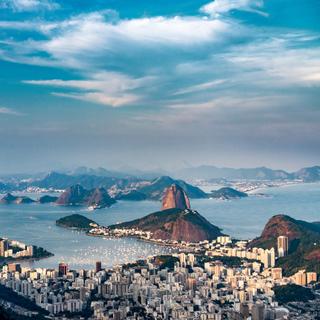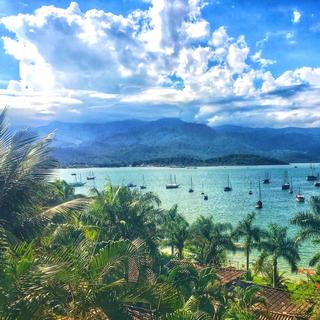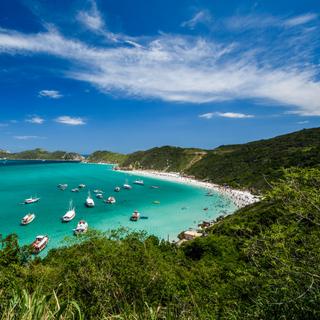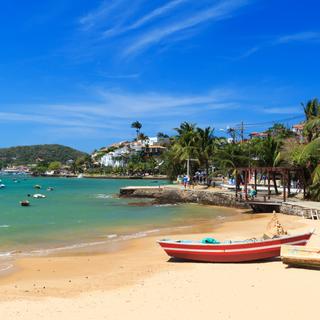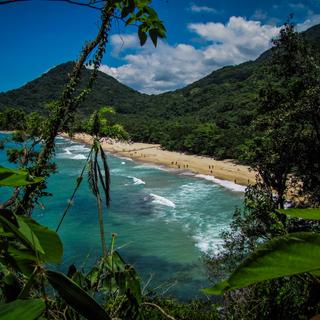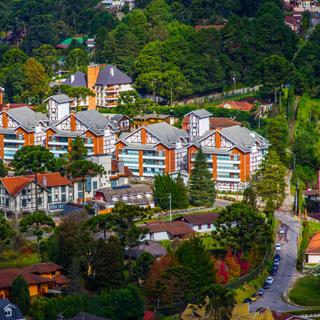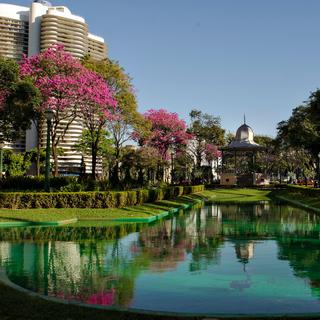Nova Iguaçu weather and climate in 2026
Day
32 °C
Night
21 °C
Sea
25 °C
Precipitation
192 mm
in month
Rainy days
15 days
in month
Daylight
13 hours
average
Sunshine
7 hours
average
Humidity
80 %
Weather charts for Nova Iguaçu
Find more destinations like this
Closest destinations for Nova Iguaçu
Closest cities for Nova Iguaçu
Weather overview for Nova Iguaçu
Weather overview
Nova Iguaçu, a city in Brazil's Rio de Janeiro state, experiences a notably warm climate year-round with a distinct wet season. On average, daytime temperatures peak at 32 °C (89 °F) in February and recede to a cooler 25 °C (78 °F) in July. The rainiest months extend from December to March, with January being the wettest (244 mm (9.61 in) of rainfall). Venturing into the drier months, the least precipitation is observed in August (around 53 mm (2.08 in)). Humidity tends to remain consistently high throughout the year, which adds to the tropical feel of the region.
January weather
January in Nova Iguaçu brings the height of the rainy season, with 244 mm (9.61 in) of rainfall and about 19 days of rain. Day temperatures remain hot, reaching 31 °C (88 °F).
February weather
February sees a slight increase in day temperatures to 32 °C (89 °F), while the monthly rainfall decreases a bit compared to January, making it a consistent yet slightly drier month.
March weather
March observes a slight decrease in daytime temperatures, averaging around 31 °C (87 °F), with a noticeable decrease in rainfall as the wet season starts to wind down.
April weather
April continues the trend with a decreasing number of wet days to about 12 days and averaging 29 °C (84 °F) in daytime temperatures.
May weather
May marks the onset of drier conditions with a significant drop in rainfall and an average of 27 °C (80 °F) for daytime temperatures, signaling the approach of the dry season.
June weather
June sees continued dry conditions and cooler temperatures, with the daytime high averaging around 26 °C (79 °F).
July weather
In July, the temperatures in Nova Iguaçu drop to their yearly low, with a daytime average of 25 °C (78 °F) and the least rain during the year.
August weather
Warmth begins to return in August with average daytime temperatures of 26 °C (79 °F), and it remains the final month of the dry season.
September weather
As September arrives, there's a gradual return of rain with about 11 days of rainy days and comfortable daytime highs of 27 °C (80 °F).
October weather
October sees an uptick in both temperatures, to 28 °C (82 °F) on average, and precipitation, indicating the start of the rainy season.
November weather
November's weather is characterized by continued warmth, averaging 29 °C (84 °F), and heightened precipitation as the rainy season takes hold.
December weather
December heralds the peak of the rainy season with heavy rainfall, making it one of the wettest months, accompanied by warm 30 °C (85 °F) average daytime temperatures.
FAQs
How often does it rain in Nova Iguaçu in January?
Rain is a common occurrence in Nova Iguaçu during January, with rain seen on approximately 19 days throughout the month.
Is February warmer than January in Nova Iguaçu?
Yes, February is slightly warmer than January in Nova Iguaçu, with an average high temperature of 32 °C (89 °F).
Does the rain start to subside in March in Nova Iguaçu?
Yes, rainfall does begin to decrease in March in Nova Iguaçu, marking a gradual transition away from the wettest period of the year.
What's the weather trend in Nova Iguaçu during April?
April's weather in Nova Iguaçu is characterized by a further decrease in both rainfall and temperature, signaling the end of the wet season.
Is May much drier than the previous months in Nova Iguaçu?
Yes, May in Nova Iguaçu is considerably drier, with substantially less rainfall compared to the city's wet season months.
How does the weather in Nova Iguaçu change as we move into June?
June in Nova Iguaçu brings a cooler and drier climate, with reduced rainfall and slightly lower daytime temperatures.
What is the coldest month in Nova Iguaçu?
July is the coldest month in Nova Iguaçu, with night temperatures dropping to an average of 15 °C (59 °F).
Does the temperature start to increase again in Nova Iguaçu during August?
Yes, temperatures in Nova Iguaçu in August start to climb back up, marking the transition towards warmer months.
What changes occur in Nova Iguaçu's climate in September?
September in Nova Iguaçu is a transitional month, characterized by a gradual increase in both temperature and rainfall as it moves away from the dry season.
Does the rainy season start in October in Nova Iguaçu?
Indeed, October marks the beginning of the rainy season in Nova Iguaçu, with increased rainfall and warmer temperatures.
Is November in Nova Iguaçu much wetter than October?
November in Nova Iguaçu generally sees more rainfall than October, reinforcing the presence of the rainy season.
How intense is the rainy season in Nova Iguaçu in December?
December is among the peak months of the rainy season in Nova Iguaçu, with high rainfall totals and many wet days.
We make the most from 40 years of historical weather data to predict the best weather conditions.
Deciding on where to go for a holiday is hard sometimes. Get inspired by the most popular destinations.
We aggregate data from combining multiple weather sources to ensure accuracy of the highest order.
